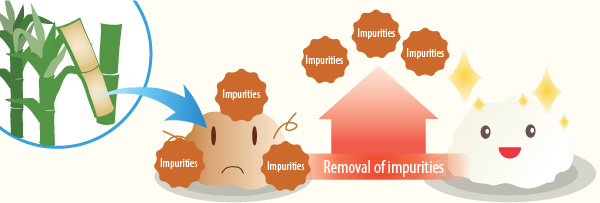Tokyo Food Safety Information Center » Tokyo Metropolitan Government food safety FAQ » Is white sugar chemically bleached?
Is white sugar chemically bleached?

Is white sugar chemically bleached?
- I feel like colored sugars should have more nutrients than white sugar.
- Does eating too much sugar lead to obesity and lifestyle diseases?

White sugar is made by removing impurities from raw materials such as sugar beets and sugarcane to create a crystalized form of sucrose, the chemical that makes up table sugar. White sugar is white because sucrose is white – accordingly, no bleaching agents are used to make white sugar.


Depending on the degree of refinement, a variety of sugars can be made, from brown sugar to white and soft brown sugar.
Brown sugar contains minerals like potassium and calcium and vitamins B1 and B2. As it is believed the average person obtains sufficient amounts of these nutrients through a normal diet, there is no need to specifically consume significant amounts of brown sugar.
Meanwhile, as white sugar is sugar from which all impurities have been removed, it has virtually not vitamins or minerals.
Soft brown sugar is made from the sugar solution (molasses) created as part of the final stage in making white sugar. Accordingly, like white sugar, it has virtually no nutrients.
It should also be noted that obesity and lifestyle diseases have a variety of causes. As the energy your body obtains from sugar is the same as any other carbohydrate, sugar is not the sole cause of obesity and lifestyle diseases.
Note, however, that extreme overconsumption, like with all foods, can lead to illness.
Brown sugar contains minerals like potassium and calcium and vitamins B1 and B2. As it is believed the average person obtains sufficient amounts of these nutrients through a normal diet, there is no need to specifically consume significant amounts of brown sugar.
Meanwhile, as white sugar is sugar from which all impurities have been removed, it has virtually not vitamins or minerals.
Soft brown sugar is made from the sugar solution (molasses) created as part of the final stage in making white sugar. Accordingly, like white sugar, it has virtually no nutrients.
It should also be noted that obesity and lifestyle diseases have a variety of causes. As the energy your body obtains from sugar is the same as any other carbohydrate, sugar is not the sole cause of obesity and lifestyle diseases.
Note, however, that extreme overconsumption, like with all foods, can lead to illness.